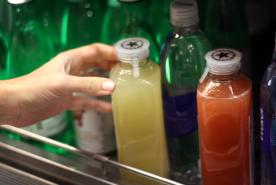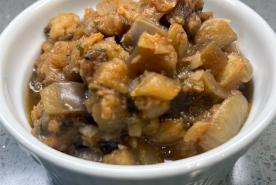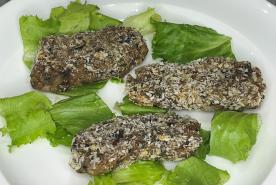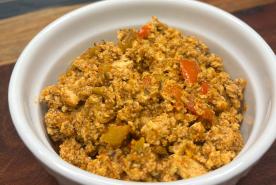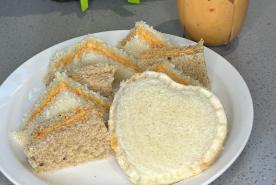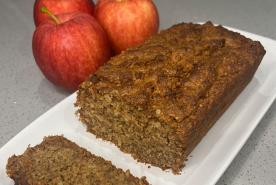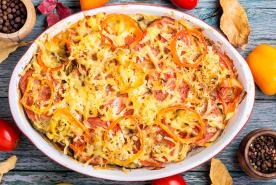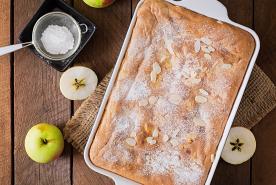Last Updated: March 05, 2025
Medically reviewed by NKF Patient Education Team
Following a Special Diet on Home Dialysis
When you are on home dialysis, you will need to follow a special diet because your kidneys cannot remove enough waste and fluid from your blood on their own.
To help your body work and feel well, you will need to:
- Limit the amount of fluid you eat or drink
- Eat the right balance of calories, protein, vitamins, and minerals each day. You may need to change some of the foods you usually eat.
A dietitian can help you figure out how to make these changes work for you.
Eating Well on Home Dialysis
Below are general guidelines to help you stay healthy while on home dialysis. For more specific instructions, visit a dietitian to help you create a diet or meal plan for you.
Eat enough calories
When you start home dialysis, you may have trouble getting enough calories. Calories can help your body:
- Have enough energy
- Keep a steady weight
- Build muscle and tissue
To help you get enough calories, eat smaller meals five to six times a day, instead of three larger meals a day. The smaller, more frequent meals can make it easier to get more calories.
Eat foods high in protein
When dialysis filters your blood, it removes extra fluid and waste. However, it also removes proteins that your body needs. Protein can help your body:
- Build and repair muscles
- Fight infections
You can eat foods high in protein to help your body replace this protein, including:
- Fresh meats such as lean beef, pork, chicken, turkey, fish, and seafood
- Eggs or egg whites
- Beans (such as black beans), lentils, split peas, edamame, nuts, nut butters and tofu
- Dairy products such as milk, yogurt, and cheese. However, dairy can be high in phosphorus, a mineral you may need to lower in your diet, so always follow your meal plan
Explore kidney-friendly superfoods: discover new recipes, enjoy healthy twists on favorites, and make every meal nutritious for your kidney health.
Eat low foods in sodium (salt)
Eating a lot of sodium (salt) can cause your body to hold on to more fluid. It can also make you thirsty, causing you to drink more fluid.
Try to eat less than 2,300 milligrams of sodium each day. This is about a quarter teaspoon of salt each day. To lower the amount of sodium you eat, avoid these foods:
- Processed meats such as bacon, sausage, or cold cuts (lunch meats such as sliced ham, turkey, or pepperoni)
- Most canned foods. If you do eat canned foods, rinse the food with water before eating because the liquid has a lot of salt in it.
- Most frozen dinners
- Dehydrated soups such as ramen noodle soup
- Salted snack foods such as chips or crackers
- Most restaurant meals. Ask the waiter if the chef can use less or no salt when you order food.
- Salty seasonings such as soy sauce, teriyaki sauce, garlic salt, or onion salt. Replace salt and salty seasoning with herbs and spices. And avoid salt substitutes with potassium.
Eat foods lower in phosphorus
Dialysis cannot remove all the extra phosphorus from your blood. Too much phosphorus in your blood can cause:
- Weak or brittle bones
- Bone pain
- Organ or heart damage
- Poor blood flow
- Skin infections
To lower the amount of phosphorus you eat, you may need to limit these foods:
- Dairy such as milk, yogurt, cheese, and ice cream. Ask if milk alternatives such as unfortified almond, oat or soy milk a better choice for you are.
- Nuts and peanut butter
- Beans and peas
Packaged and processed foods often have added phosphorus as preservatives. To tell if foods or drinks have added phosphorus, look at the food label for words containing “phosphate.” Foods that commonly contain phosphorus additives include:
- Non-dairy coffee creamers
- Dark sodas such as Coke or Pepsi
- Foods from fast food restaurants, vending machines and gas stations
- Processed meats such as cold cuts (lunch meats such as sliced ham, turkey, or pepperoni) and cheeses
- Frozen chicken nuggets and pizza
Your doctor may also prescribe these medicines to help lower the amount of phosphorus in your blood:
- A phosphate binder to take with every meal and snack. This lowers the amount of phosphorus your body absorbs from food.
- A specific type of vitamin D to help regulate your phosphorus levels
Eat the right amount of potassium
Potassium helps your muscles and heart work well. However, potassium can build up in your blood between dialysis treatments and become too high. Kidney disease and certain medications can also cause low potassium. Either extreme can be a problem.
Too much or too little potassium in your blood can cause:
- Tiredness or weakness
- Muscle pains or cramps
- Unusual heart beats
Your doctor will check your potassium levels regularly to make sure you have a healthy amount. Depending on your potassium level, you may need to eat more or less of foods with a lot of potassium, such as:
- Certain fruits and vegetables such as bananas, oranges, potatoes, and tomatoes. Canned fruits (without the liquid) usually have less potassium than fresh fruits.
- Milk and yogurt
- Beans
- Nuts and seeds
- Meats such as beef, chicken, and salmon
Your doctor may also prescribe:
- A potassium supplement if your levels are low
- A potassium binder if your levels are high. This lowers the amount of potassium your body absorbs from food.
Limit the amount of fluid in your body
People on dialysis often urinate (pee) less, so they have more fluid in their body.
Too much fluid in your body can cause:
- Your eyes, hands, or feet swell or become puffy
- Weight gain
- Shortness of breath
- Strain on your blood vessels, causing high blood pressure, which makes your heart work harder
To limit the amount of fluid in your body:
- Follow your doctor’s guidelines on how much to drink
- Follow your doctor’s guidelines on how much sodium to eat
- Count all foods that melt at room temperature as a fluid, for example ice cream, popsicles, or Jello
- Keep track of how much fluid you use when cooking, for example sauces or broth
Other vitamins and minerals
Dialysis changes your vitamin needs, and your new diet may change what you usually eat. Your doctor or dietitian will let you know if you need more or less of any vitamins or minerals in your diet.
Some vitamins, minerals, and herbal remedies can harm you while you are on dialysis, so:
- Only take supplements that your doctor tells you to take.
- Ask your doctor before you use any herbal remedies.
If you are doing peritoneal dialysis
The special dialysis fluid you will use during your treatments has a sugar called dextrose in it. Dextrose can remove extra fluid from your blood. For many people, this can lead to weight gain. For people with diabetes, this can lead to higher sugar levels.
You may be able to use a dialysis solution with less dextrose, but managing your sodium and fluid intake is important to help control fluid balance. Your healthcare provider can guide you on the best approach for your needs.
Managing Other Nutritional Needs
If you have high cholesterol
The good news is that following a dialysis-friendly diet may help you lower your blood cholesterol.
But if you still have high cholesterol, talk with a dietitian about the amount and type of fat and animal foods you eat. These can raise your cholesterol. Your doctor may also prescribe medicine to lower your cholesterol.
If you have diabetes
Recommended changes in your diet and the dextrose you absorb when doing peritoneal dialysis may affect your blood sugar. Talk with a dietitian to make a meal plan that meets your needs.
If you are vegetarian or vegan
Make sure you eat a variety of plant foods and get enough calories and protein. Talk with a dietitian about which vegetarian or vegan-friendly protein options have a good balance of potassium and phosphorous.
Making Healthy Eating Choices
Your dialysis care team will do regular blood tests to check if you are getting enough dialysis and if you have healthy levels of vitamins and minerals such as potassium.
A dietitian may:
- Look at the fat and muscle in your face, hands, arms, shoulders, and legs.
- Ask questions such as how you are following your meal plan, if you’ve lost weight, or are feeling tired or weak.
This can help them know if you are eating enough of the right foods.
Questions for your healthcare team
- Will I be able to eat a more flexible diet when I am on home dialysis?
- Will I be able to take fewer medicines when I am on home dialysis?
- Can you refer me to a dietitian to help me create a meal plan?
- What are the most important dietary changes I need to make?
- Where can I find kidney-friendly recipes?




